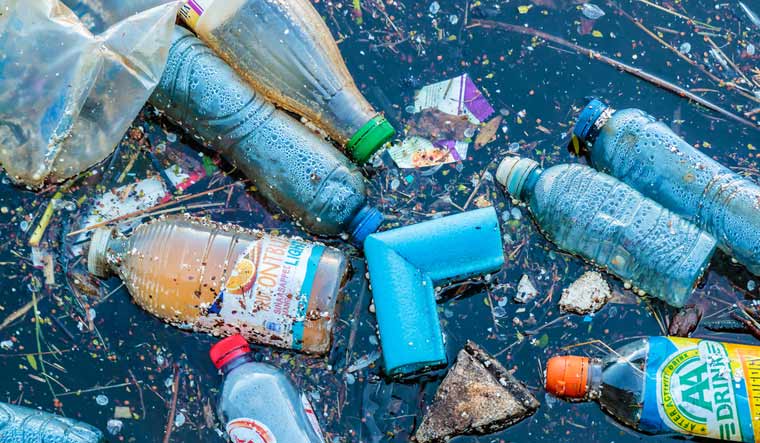India Backs UN Resolution On Human Right To Clean Environment
Jul 30, 2022 | Pratirodh Bureau
India generated around 34.7 lakh (3.47 million) tonnes of plastic waste in 2019 and 2020, according to the Central Pollution Control Board. Over the past five years, per capita plastic waste generation has almost doubled
India has voted in favour of a UN General Assembly resolution that recognises the right to a clean, healthy and sustainable environment as a human right, but dissociated itself from an operative paragraph of the text and voiced its concerns over the procedure and substance of the resolution.
The 193-member General Assembly adopted the resolution on Thursday with 161 votes in favour and abstentions by Belarus, Cambodia, China, Ethiopia, Iran, Kyrgyzstan, Russia and Syria.
While India voted in favour of the resolution, it voiced its concerns over the procedure and substance of the resolution.
The resolution recognises the right to a clean, healthy and sustainable environment as a human right and affirms that the promotion of the human right to a clean, healthy and sustainable environment requires the full implementation of the multilateral environmental agreements under the principles of international environmental law.
“India stands ready to support any effort for a better environment and to further international cooperation for environmental protection. In this context, India voted in favour of this resolution,” Counsellor in India’s Permanent Mission to the UN Ashish Sharma said, delivering the explanation of the vote in the UNGA.
“However, considering that our concerns remain outstanding, we are, therefore, constrained to dissociate ourselves with the operative paragraph 1 of the resolution,” he said. The operative paragraph 1 of the resolution reads that the UNGA recognises the right to a clean, healthy and sustainable environment as a human right.
He asserted that the UNGA resolutions do not in themselves create binding obligations, and it is only through conventions and treaties that State parties commit to a new human right and undertake appropriate obligations for the realisation of such a right.
Further, there is no clear understanding and agreed definition of terms ‘clean’, ‘healthy’ and ‘sustainable’. Currently, these terms remain open to subjective interpretations and this dilutes the very objective of the recognition proclaimed in the present resolution, Sharma said.
He voiced regret that the text of the resolution fails to have a clear reference to the foundational principle of equity in international environmental law.
Noting that India attaches great importance to the promotion and protection of human rights, including in the context of environment, Sharma said New Delhi had expressed its concerns on the resolution both in terms of procedure and substance.
“India had also expressed its concerns clearly and repeatedly, and made constructive proposals to achieve a common ground. We sincerely believe that some of these proposals could have helped in bringing us closer to the consensus.”
He said India also remains concerned that even after strong support by many member states for the inclusion of preambular paragraph 8 of the Human Rights Council resolution 48/13, which forms the basis of the current resolution, the decision of the core group was otherwise.
It is an important paragraph that reaffirms the importance of international cooperation, on the basis of mutual respect, in full compliance with the principles and purposes of the Charter, with full respect for the sovereignty of States while taking into account national priorities, Sharma said.
Sharma referred to the preambular paragraph 8 of the Human Rights Council resolution that pertained to ‘the human right to a clean, healthy and sustainable environment.’
He also noted that throughout the negotiations, India engaged constructively with an aim to reach a consensual outcome.
While appreciating the efforts of the core group – Costa Rica, Maldives, Morocco, Slovenia and Switzerland – he said India believes that providing more time to discussions could have helped in bridging the differences and addressing the concerns of various delegations.
UN Secretary-General Antonio Guterres welcomed the adoption of the historic resolution , saying it demonstrates that the member states can come together in our collective fight against the triple planetary crises of climate change, biodiversity loss, and pollution.
“The international community has given universal recognition to this right and brought us closer to making it a reality for all.”
He, however, noted that adoption of the resolution is only the beginning and urged states to make the right to a clean, healthy and sustainable environment a reality for everyone, everywhere.
“The resolution will help reduce environmental injustices, close protection gaps and empower people, especially those that are in vulnerable situations, including environmental human rights defenders, children, youth, women and indigenous peoples. The resolution will also help states accelerate the implementation of their environmental and human rights obligations and commitments.”
President of the 76th Session of the UN General Assembly Abdulla Shahid said in a tweet that the UNGA adopted a historic resolution that recognised for the first time, that everyone, everywhere, has a human right to live in a clean, healthy and sustainable environment.
Sharma stressed that environment protection is part of India’s cultural values and our traditions have for long stressed the importance of living in harmony with nature.
He pointed out that at COP26, the United Nations Climate Change conference in Glasgow, Prime Minister Narendra Modi had proposed a one-word movement, LIFE, a mass movement that influences lifestyle for environment, promoting mindful and deliberate utilisation of resources instead of mindless and destructive consumption.
“India is making rapid strides towards inclusive and overall sustainable development. This is being done both at the national level and globally through international partnerships,” he said.
He said that India has worked with partners for significant global initiatives for environmental protection that include the International Solar Alliance, the focus on One Sun, One World, One Grid, Coalition for Disaster Resilient Infrastructure and Leadership Group for Industry Transition. (PTI)
